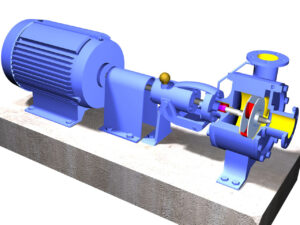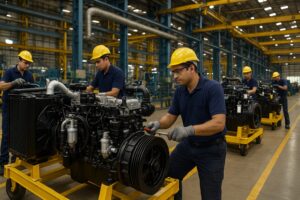1. Company Overviews
Shakti Pumps (India) Limited (BSE: 531431, NSE: SHAKTIPUMP): Founded in 1982, Shakti Pumps is a leading manufacturer of energy-efficient submersible pumps, solar pumps, pressure booster pumps, and pump motors. The company is known for its strong emphasis on innovation, particularly in solar pump technology. Shakti Pumps operates in various sectors including agriculture, industrial, domestic, and sewage.
Kirloskar Brothers Limited (BSE: 500241, NSE: KIRLOSBROS): Established in 1888, KBL is one of India’s oldest and most reputed pump manufacturing companies. The company offers a wide range of products including centrifugal pumps, valves, and hydro turbines. KBL serves various industries such as agriculture, oil and gas, power, and water supply.
KSB Limited (BSE: 500249, NSE: KSB): KSB Limited, part of the global KSB Group, has been operating in India since 1960. It specializes in high-quality pumps and valves used in sectors like water treatment, building services, energy, and industry. KSB is known for its engineering excellence and innovative solutions.
Roto Pumps (BSE: 517500): Founded in 1968, Roto Pumps is a leading manufacturer of positive displacement pumps, including progressive cavity pumps and twin screw pumps. The company caters to industries such as oil and gas, food and beverage, wastewater treatment, and chemicals.
2. Market Segments
Shakti Pumps:
- Agriculture: Solar submersible pumps, irrigation pumps.
- Industrial: Pressure booster pumps, stainless steel submersible pumps.
- Domestic: Residential water supply pumps.
- Sewage: Sewage submersible pumps.
KBL:
- Agriculture: Diesel and electric-driven pumps.
- Oil & Gas: Pumps for drilling, production, and refinery processes.
- Power: Pumps for thermal, nuclear, and hydro power plants.
- Water Supply: Municipal water supply and wastewater treatment pumps.
KSB:
- Water Treatment: Pumps for drinking water, wastewater, and desalination.
- Building Services: Pumps for heating, ventilation, and air conditioning (HVAC).
- Energy: Pumps for power plants.
- Industry: Pumps for chemical, pharmaceutical, and food industries.
Roto Pumps:
- Oil & Gas: Positive displacement pumps for upstream, midstream, and downstream processes.
- Food & Beverage: Hygienic pumps for processing and packaging.
- Wastewater Treatment: Sludge and slurry handling pumps.
- Chemicals: Corrosion-resistant pumps for chemical processing.
3. Future Strategies
Shakti Pumps:
- Innovation in Solar Technology: Expanding the range of solar-powered pumps to increase market penetration.
- Export Market Expansion: Increasing exports to Africa, South East Asia, and Latin America.
- Diversification: Broadening the product portfolio to include more energy-efficient solutions.
KBL:
- R&D Focus: Investing in research and development to innovate new products.
- Digital Transformation: Implementing digital solutions to enhance operational efficiency.
- Global Expansion: Strengthening presence in international markets through strategic alliances and acquisitions.
KSB:
- Sustainable Solutions: Developing eco-friendly products to meet the increasing demand for sustainable solutions.
- Technological Advancement: Utilizing cutting-edge technology for product innovation.
- Market Penetration: Expanding market share in the water and wastewater treatment sectors.
Roto Pumps:
- Capacity Expansion: Increasing production capacity to meet growing demand.
- Product Innovation: Focusing on developing new positive displacement pumps with advanced features.
- Global Reach: Expanding the global distribution network to enhance market presence.
4. Strengths and Weaknesses
Shakti Pumps:
- Strengths: Strong focus on solar technology, robust export strategy, diverse product range.
- Weaknesses: High dependency on the agriculture sector, vulnerability to government policy changes.
KBL:
- Strengths: Extensive product range, established brand reputation, strong R&D capabilities.
- Weaknesses: Intense competition in the global market, dependency on large-scale projects.
KSB:
- Strengths: High-quality products, engineering excellence, strong global presence.
- Weaknesses: High production costs, reliance on industrial and infrastructure sectors.
Roto Pumps:
- Strengths: Specialized in positive displacement pumps, strong presence in niche markets.
- Weaknesses: Limited product diversification, smaller market share compared to larger competitors.
5. Financial Performance
Shakti Pumps:
- Revenue: ₹129.4 crore
- Net Profit: ₹20.3 crore
- Market Capitalization: ₹1,450 crore
KBL:
- Revenue: ₹2,740 crore
- Net Profit: ₹150 crore
- Market Capitalization: ₹2,880 crore
KSB:
- Revenue: ₹1,980 crore
- Net Profit: ₹212.6 crore
- Market Capitalization: ₹3,500 crore
Roto Pumps:
- Revenue: ₹350 crore
- Net Profit: ₹50 crore
- Market Capitalization: ₹630 crore
6. Investors and Customers
Shakti Pumps:
- Investors: Promoters hold a significant share, increasing institutional investor interest.
- Customers: Farmers, industrial clients, municipal corporations.
KBL:
- Investors: Diverse investor base including institutional and retail investors.
- Customers: Large industrial clients, government projects, international clients.
KSB:
- Investors: Strong institutional investor presence, global investors.
- Customers: Industrial clients, infrastructure projects, water management authorities.
Roto Pumps:
- Investors: Promoters with significant shareholding, niche market investors.
- Customers: Industrial clients, oil and gas companies, food processing units.
7. Summary
Shakti Pumps, KBL, KSB Limited, and Roto Pumps are prominent players in the pump manufacturing industry, each with unique strengths and market strategies. Shakti Pumps leads in solar technology, KBL boasts a broad product range and historical brand value, KSB excels in high-quality and innovative solutions, and Roto Pumps specializes in positive displacement pumps. While each company faces intense competition, their distinct approaches to innovation, market expansion, and customer focus position them uniquely in the industry.




